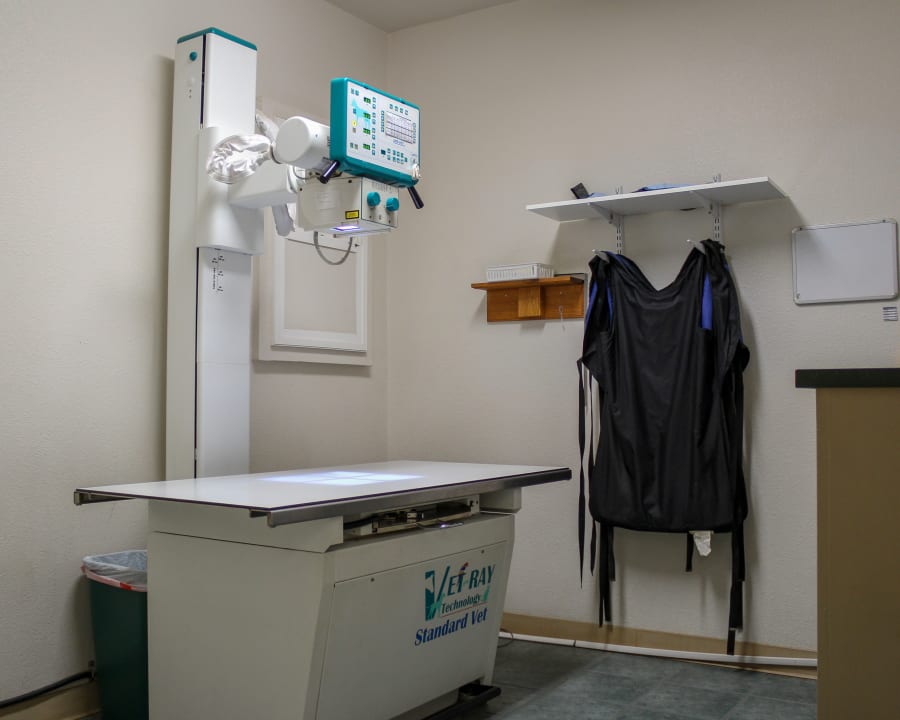Veterinary Diagnostic Lab
At Taylor Veterinary Emergency, we have advanced tools to help accurately diagnose your pet's medical issues. We offer a variety of services, from digital radiology to ultrasound.
We use electromagnetic radiation, high frequency sound waves and other technologies for diagnostic imaging. This allows us to produce highly detailed images of your pet's internal structures.
Our laboratory can also test blood and perform fecal exams and urinalysis to test for signs of internal infection or problems. These tests can be the best start to diagnosing your pet's medical condition if you suspect there is something wrong.
With our diagnostic imaging capabilities, we can efficiently produce accurate diagnostic information about your dog or cat's condition and provide immediate treatment options.

In-House Lab & Veterinary Pharmacy in Turlock
We perform tests and get results quickly in our in-house laboratory so that we can diagnose your pet's symptoms and begin treatment as soon as possible.
Our pet pharmacy in Turlock is stocked with a range of prescription diets and medications, providing us with quick access to any medications your pet may need while in our care.

Taylor Veterinary Emergency Diagnostic Services
With our in-house veterinary diagnostics lab we are pleased to offer advanced diagnostic testing to allow our vets to provide an accurate diagnosis of your pet's medical issues.
-
Radiography (Digital X-rays)
Using a radiograph (digital x-ray), we can examine your pet's internal systems to reveal information that may be invisible from the outside.
Radiography is safe, painless and non-invasive. It uses only very low doses of radiation. Because the level of radiation exposure required to perform radiography is very low, even pregnant females and very young pets can undergo this procedure.
Radiographs can be used to evaluate bones and organs, and diagnose conditions including broken bones, chronic arthritis, bladder stones, spinal cord diseases and some tumors.
-
Ultrasound
With ultrasound imaging, we expose part of the body to high-frequency sound waves to produce images of the inside of the body.
Because we capture ultrasound images in real-time, we can see the structure and movement of your pet's internal organs, as well as blood flowing through the blood vessels.
Having this valuable technology available to our vets in our in-house lab means that your dog or cat's condition can be diagnosed quickly, and treatment can start sooner.
-
Endoscopy
An endoscope consists of a very tiny camera with a light attached to the end of a flexible tube.
When we perform an endoscopy, a long, thin tube is inserted directly into the body to observe an internal organ or tissue in detail.
Minimally invasive endoscopes can be inserted into the openings of the body such as the mouth or anus.
-
Bloodwork
At our vet lab in Turlock we are able to run a number of common and specialized blood tests to determine the health of your pet, and to diagnose illness.
Some of the most common veterinary blood tests we do are CBC (complete blood count), white blood count, hemoglobin and MCHC (mean corpuscular hemoglobin concentration), hematocrit, platelets, eosinophils, and blood serum profile.
-
Urinalysis
Urinalysis is a key diagnostic test that provides your vet with essential insights into the physical and chemical properties of your pet's urine.
Urinalysis is primarily used to assess the health of your animal's kidneys and urinary tract system, but it can also be helpful in detecting issues in other organ systems and is important for diagnosing metabolic diseases such as diabetes.
This is a valuable diagnostic test for both healthy and sick animals and should be included in any comprehensive evaluation of your pet's overall health.
-
Fecal Exam
A fecal exam is the microscopic examination of your pet's feces, which can be done at our in-house vet lab in Turlock.
The ultimate goal of a fecal exam is to identify and treat any GI infections that could be compromising your pet's health and even the health of your family. Fecals allow your vet to determine if your pet has intestinal parasites such as roundworms or hookworms.
Parasites can make pets uncomfortable, irritable, and lead to more serious conditions. Some can even be transmitted to humans.
Since these parasites live in your pet’s gastrointestinal tract, they are often hidden from view. The only way to detect them is with a fecal exam.
Annual fecal examinations should be a vital part of every pet's routine wellness exam.
-
Oxygen Therapy
Oxygen therapy is used when a pet is having breathing difficulties when you bring them into the office.
Using compressed oxygen stored in a portable tank, an increased amount of oxygen is delivered, allowing the animal to be stabilized for tests, surgery, or healing.
There are many different delivery methods for oxygen therapy so we are able to work with stressed or overactive pets to ensure they get the oxygen they need.